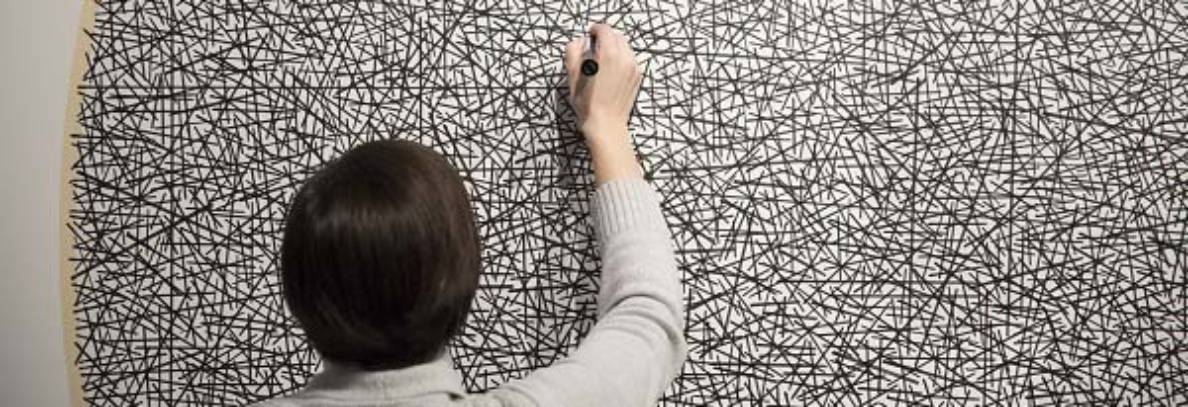Note the ways these artists create a visual method for documenting aspects of their life (or others’ lives), from where they go, to how they spend their time, to who else is in their orbit, to how long they live.
On Kawara
On Kawara has based the entirety of his collection of books, paintings, and drawings on the arbitrariness and subjectivity of the way we measure time. Many of his projects are ongoing, making Kawara himself, as the recorder of time, one of the primary materials in his conceptual works. Kawara is perhaps best known for the “date paintings” in his Today series (1966-), each of which conforms to one of eight predetermined sizes and features a date in hand-lettered typography painted over a monochromatic background. The artist completed the canvases while living or staying in over 100 cities around the world. Each date painting is displayed with a handcrafted cardboard box and a clipping from a newspaper published in the same city and on the same day that the artist made the work. Kawara continues to create new works in the series.




“Today” series, 1966-2013
Acrylic on canvas
8 x 10 inches (20.3 x 25.4 cm)

One Million Years (Past), 1970-1971
10 leather hardbound volumes 2,000 pages

On Kawara: Reading One Million Years (Past and Future)
installed at documenta 11, Kassel, Germany in 2002

Pages from One Million Years (Future) One Million Years (Future), 1980-1998
10 leather hardbound volumes, 2,000 pages
Kawara’s interest in how our society uses dates to grasp time’s elusiveness can be seen in the two–volume book project One Million Years. The first book, Past, is dedicated to “all those who have lived and died,” and covers the years from 998,031 BC to 1969 AD. The second book, Future, is dedicated to “the last one,” and begins with the year 1993 AD and ends with the year 1,001,992 AD. At the request of the artist, portions of the books have been read aloud in locations around the world. A recording of these readings is part of Kawara’s installation here.

Teching Hsieh
One Year Performance 1980-1981
(Video in link, first 1min 30 seconds gives a succinct explanation of the piece)
Germaine Koh:
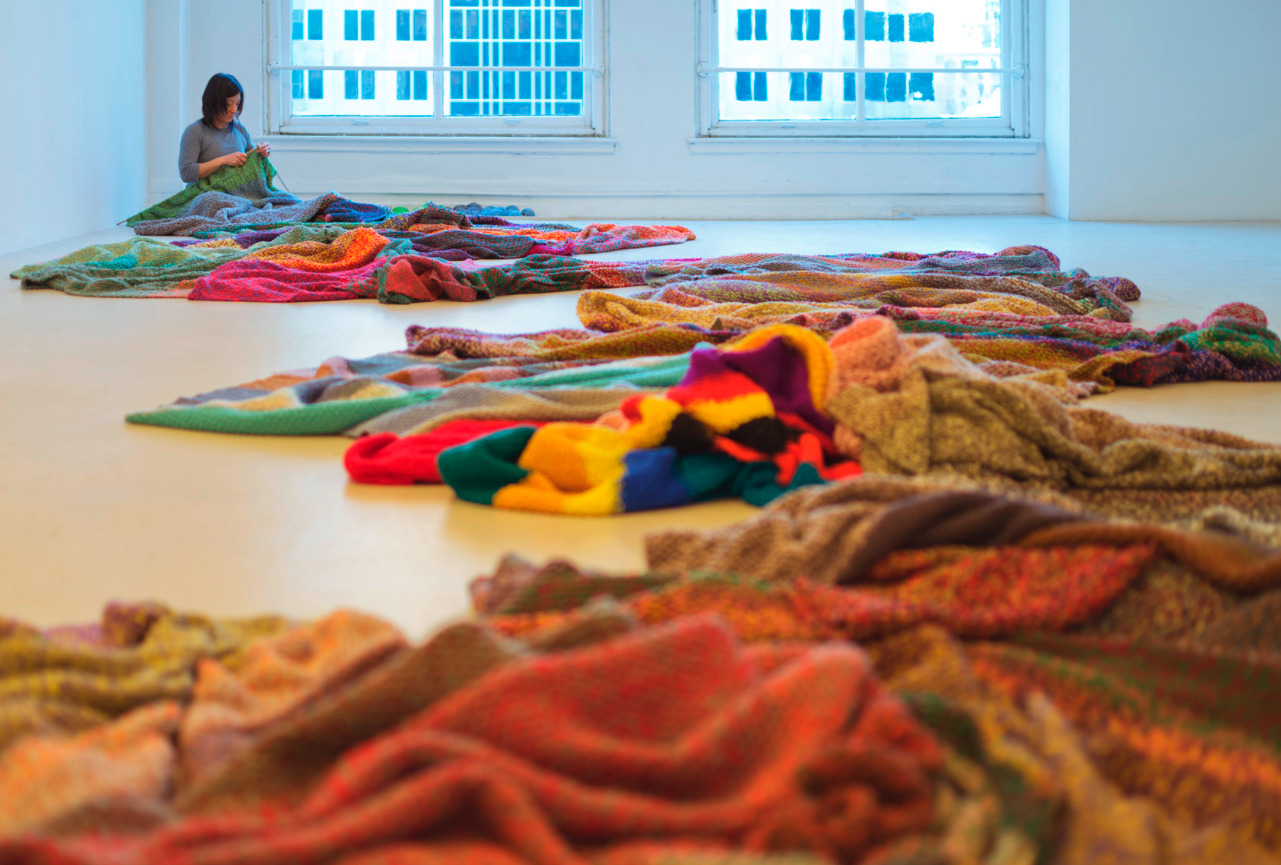
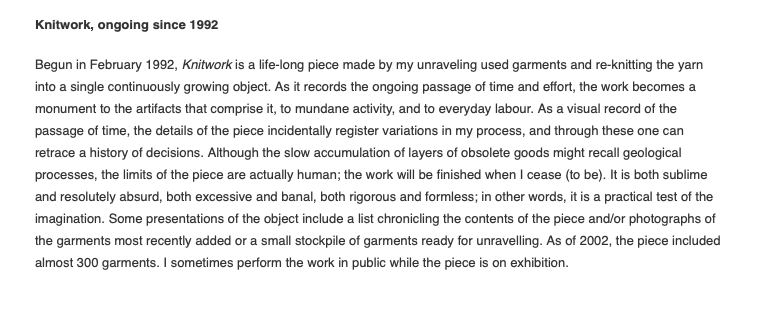
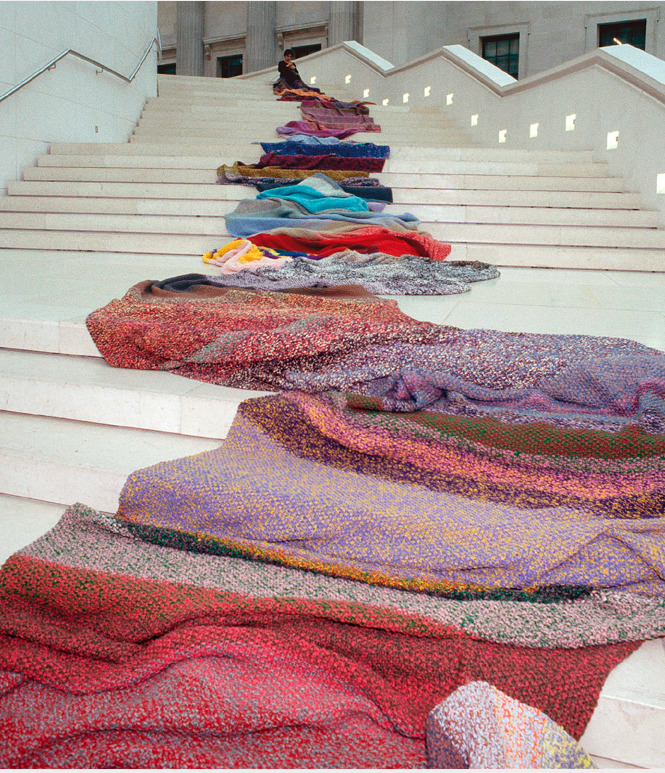
Douglas Gordon, List of Names, 1990 to ongoing
“This work consists of a list of names, displayed in columns, as if it were a war memorial or a roll of honour. They are the names of everyone the artist has ever met, or more precisely, everyone he can remember meeting. Gordon says of this work, ‘It was an accurate and honest statement but it was full of mistakes (like forgetting the names of some friends), so there were some embarrassing elements in the work, but that all seemed to be quite close to the truth of how our head functions anyway. Sometimes it works and sometimes it doesn’t.” From: https://www.a-n.co.uk/media/52431069/)


Kelly Mark: Artist Statement
I have always had an intense preoccupation with the differing shades of pathos and humour found in the repetitive mundane tasks, routines and rituals of everyday life. Hidden within these spans of time can be found startling moments of poetic individuation, and an imprint of the individual within the commonplace rituals of society. Individuation, especially within this uniformity, although subtle and frequently paradoxical, is something I find myself returning to again and again. Through my ‘will to order’ and my frequently inane sense of humour my objective is the investigation, documentation and validation of these singular ‘marked’ and ‘unmarked’ moments of our lives…
In & Out – 1997 ongoing until 2032
Steel time card racks & punched cards
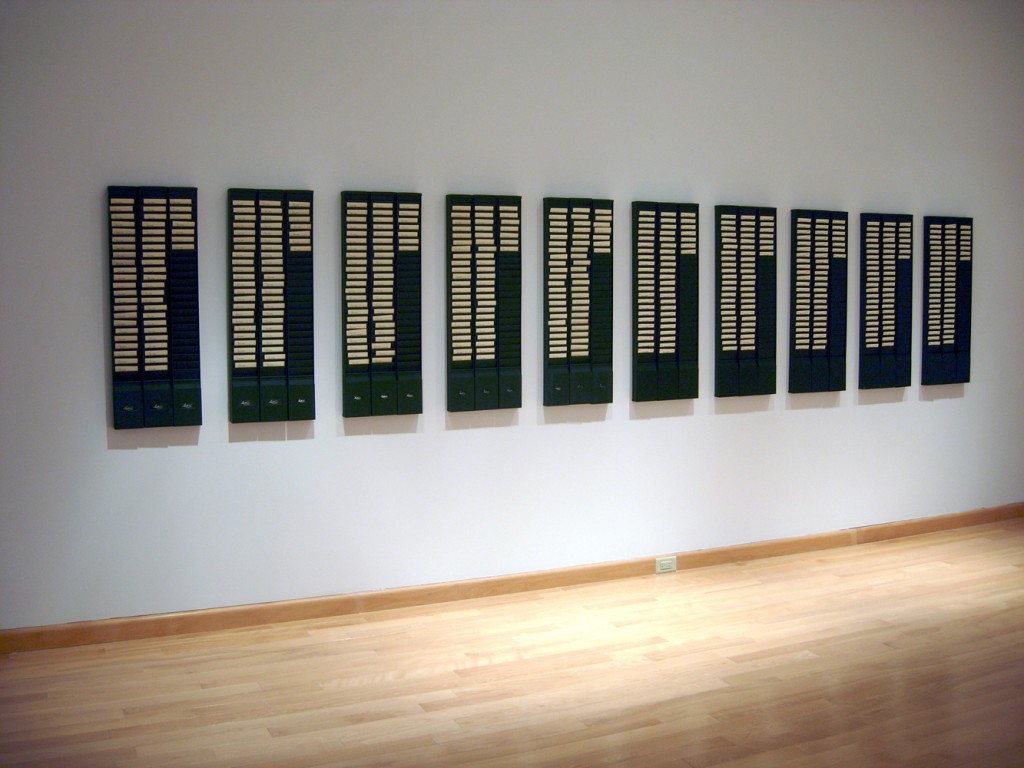
Current dimensions of installed work is approximately 28 feet
This work was purchased by a private collector in 1999 and he continues to purchase each years cards
Installation view of 1997-2008: Time as Activity at Netwerk Center for Contemporary Art. Aalst, Belgium 2009
Ongoing project where I keep track of my ‘working hours’ in the studio on an old punch clock. Started in 1997, this project will end in 2032 when i turn 65.
Sourced from Kelly Mark’s Website
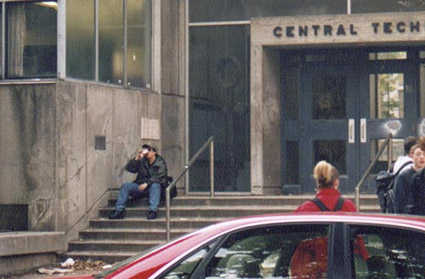
Note how these artists try to make a portrait of a larger attribute of humanity – using strategies of conceptual art, systems, series’, and stand-ins to help us make sense of abstract ideas, or things that are not usually documented, and to respond in new ways.
Micah Lexier:


A Portrait of David, 1994.
Life-size photographs of men and boys named David, one of each each from age 1 to age 75. Commissioned by and presented at The Winnipeg Art Gallery

David Then & Now, 2004.
Bus shelter project presented throughout downtown Winnipeg, presented by Plug In ICA. This is the follow up project to A Portrait of David, in which we photographed one David of every age, from age 1 to age 75. For this project, David Then & Now, we located as many of the original Davids as possible and photographed them exactly 10 years later.
Sourced from Micah Lexier’s Tumblr
Katie Patterson:
Langjökull, Snæfellsjökull, Solheimajökull
2007
Sound recordings from three glaciers in Iceland were pressed into three records, then cast and frozen using the meltwater from each corresponding glacier. The discs of ice were then played simultaneously on three turntables until they melted completely.



All the Dead Stars
2009
A map documenting the locations of just under 27,000 dead stars – all that have been recorded and observed by humankind.

2019
Adrian Piper
Adrian Margaret Smith Piper (b. 1948) is a first-generation Conceptual artist and analytic philosopher. She began exhibiting her artwork internationally at the age of twenty, and graduated from the School of Visual Arts in 1969. Adrian Piper produces artwork in a variety of traditional and nontraditional media, including photo-text collage, drawing on pre-printed paper, video installation, site-specific sculptural installation, digital imagery, performance and sound works. Piper’s works locate the viewer in a direct, unmediated and indexical relation to the concrete specificity of the object of awareness. They consistently explore the nature of subjecthood and agency, the limits of the self, and the continuities and discontinuities of individual identity in the metaphysical, social and political contexts.

Catalysis III, 1970
In her Catalysis series, Adrian Piper physically transformed herself into an odd or repulsive person and went out in public in New York to experience the frequently disdainful responses of others.


In 1973, Adrian Piper created an alter-ego, the Mythic Being, who became the basis of a pioneering series of performances and photo-based works. Piper—a light-skinned woman of mixed racial heritage—transformed herself into the Mythic Being by donning an Afro wig, sunglasses, and mustache and adopting behavior conventionally identified as masculine. She then explored how she and others responded to the Mythic Being. In the process, she transformed the conceptual art practices common in the period, infusing them with strong personal and political content.

Calling Card, 1986
Piper also explores issues of personal identity and social boundaries. Using the antiquated nineteenth-century social convention of calling cards, Piper adopts a passive-aggressive approach to showcase how racism and sexism are intrinsically harmful. One of the two “calling cards” in the Indiana University Art Museum’s collections (the brown one) uses misperception of her race (she is a light-skinned African American) to directly confront anyone who utters a racist remark in her presence. The white card thwarts the presumption of men that she is available simply because she is unaccompanied. She says she handed these cards out in the above situations and has since exhibited them for viewers to take and use. While not precious or valuable in the traditional sense, they clearly represent her ideology. The focus in these mass-produced objects is not on craft, but on the ideas behind their production.
Sophie Calle:
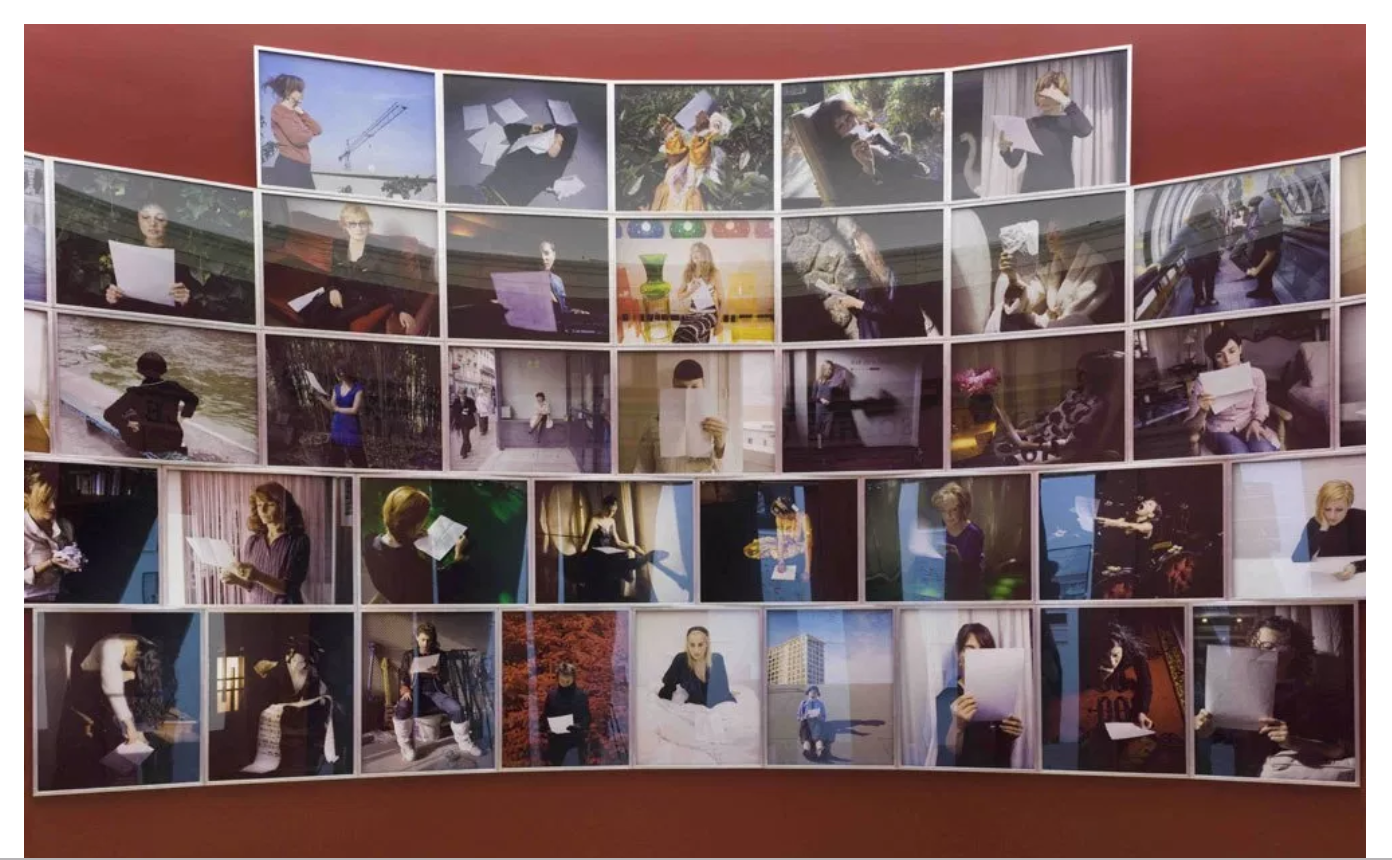
Take Care of Yourself:
In 2007, the conceptual and performance artist Sophie Calle was chosen to represent France at the Venice Biennale. The installation she created for the French pavilion, titledPrenez soin de vous (Take Care of Yourself), comprises hundreds of photographs, documents and videos that depict 105 women’s (plus two puppets’ and a parrot’s) interpretations of the same source document: a break-up email sent to the artist by her lover in 2004 which ends with the cryptic and seemingly offensive parting, ‘Take care of yourself’. The email’s clichéd ending became the instructional imperative for the artwork but, unlike her other works, in which Calle played a central and active role as artist-protagonist, Prenez soin de vous constitutes a dispersal of autonomous artistic authorship, offering up in its place a collective form of interpretive labour by other women. By inviting so many different women to interpret the breakup email based on their professional expertise, Calle’s project engages – perhaps accidentally – in a feminist critique of women’s work in the post-industrial, service-based economy or a commentary on women’s current roles as both producers and consumers of culture.
Spring Hurlbut
Memorial portraits, representing the intangible:
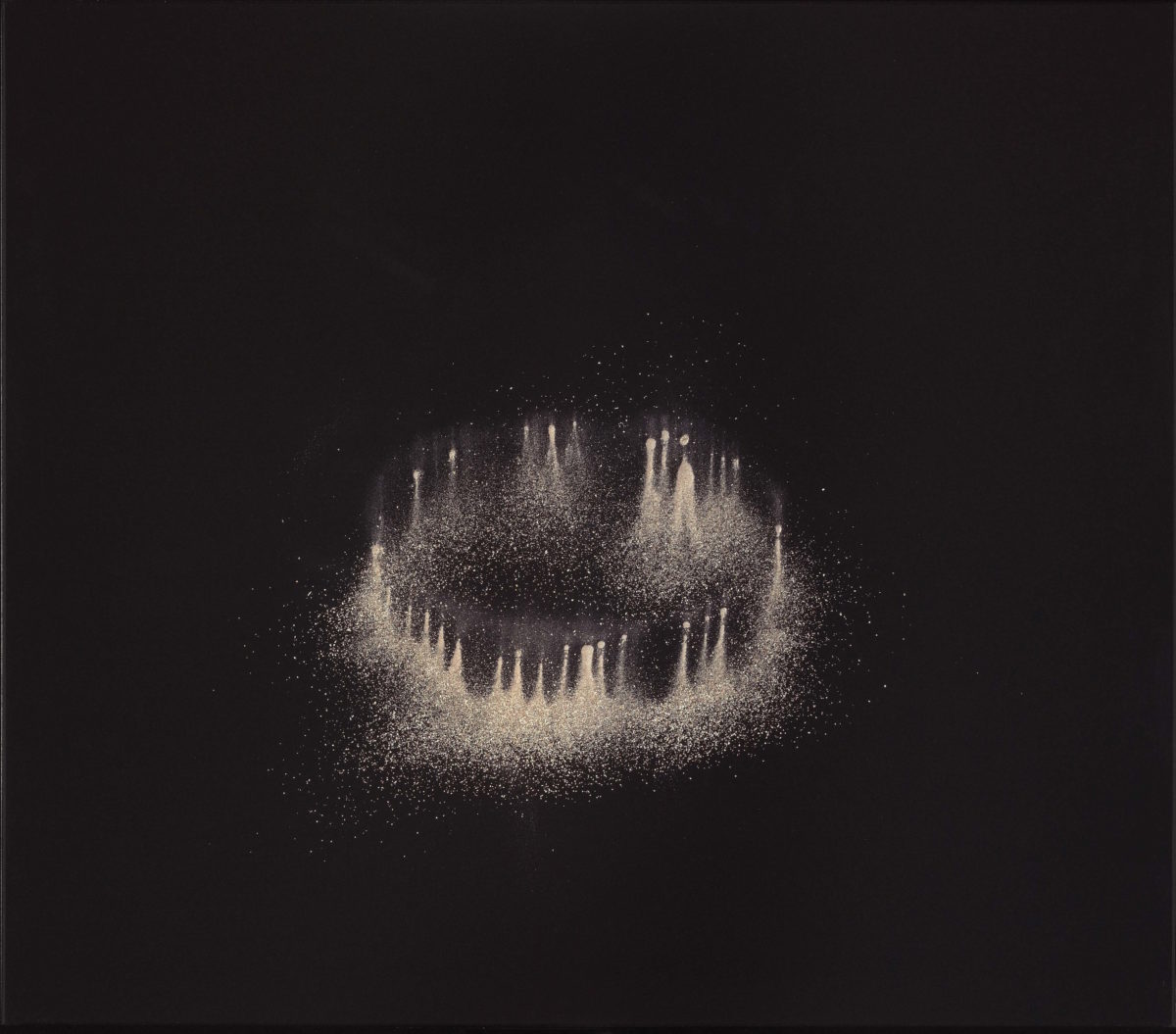
“Hurlbut “wanted to do something that was secular, but something that was meaningful to me, and that was to investigate the ashes of my late father, James.”
Hurlbut had her father’s ashes in her Toronto studio for five years. Finally, she decided to photograph them.
“When I began this process, I didn’t even think I could call it art. It was just something I urgently needed to do for myself.” But when she exhibited the photographs for people who had allowed her to use the ashes of their loved ones, “it turned this very sombre affair into a cathartic experience.” From https://artsfile.ca/bearing-witness-governor-generals-visual-arts-laureates-ask-much-of-the-viewer/
Felix Gonzales Torres:
Felix Gonzalez-Torres
Felix Gonzalez-Torres was born in Guáimaro, Cuba, in 1957. He earned a BFA in photography from Pratt Institute in Brooklyn, New York, in 1983. Printed Matter, Inc. in New York hosted his first solo exhibition the following year. After obtaining an MFA from the International Center of Photography and New York University in 1987, he worked as an adjunct art instructor at New York University until 1989. Throughout his career, Gonzalez-Torres’s involvement in social and political causes as an openly gay man fueled his interest in the overlap of private and public life. From 1987 to 1991, he was part of Group Material, a New York-based art collective whose members worked collaboratively to initiate community education and cultural activism. His aesthetic project was, according to some scholars, related to Bertolt Brecht’s theory of epic theater, in which creative expression transforms the spectator from an inert receiver to an active, reflective observer and motivates social action. Employing simple, everyday materials (stacks of paper, puzzles, candy, strings of lights, beads) and a reduced aesthetic vocabulary reminiscent of both Minimalism and Conceptual art to address themes such as love and loss, sickness and rejuvenation, gender and sexuality, Gonzalez-Torres asked viewers to participate in establishing meaning in his works.
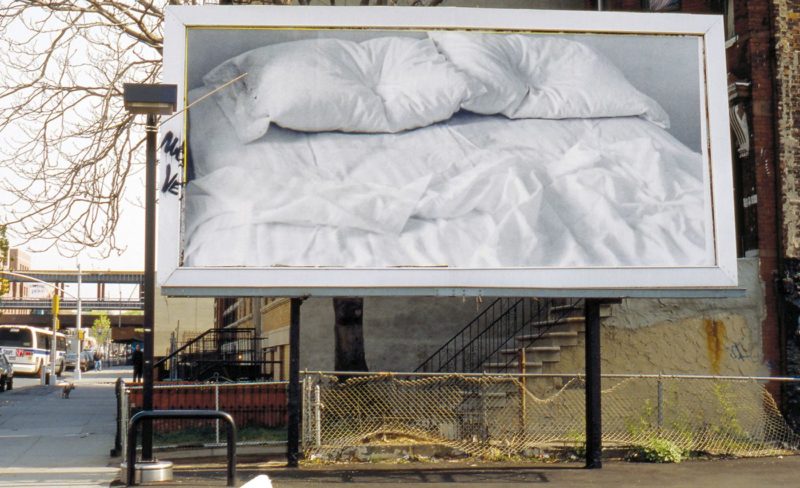

Untitled
1989
Billboard

Untitled (Perfect Lovers)
1987-1990
Wall clocks
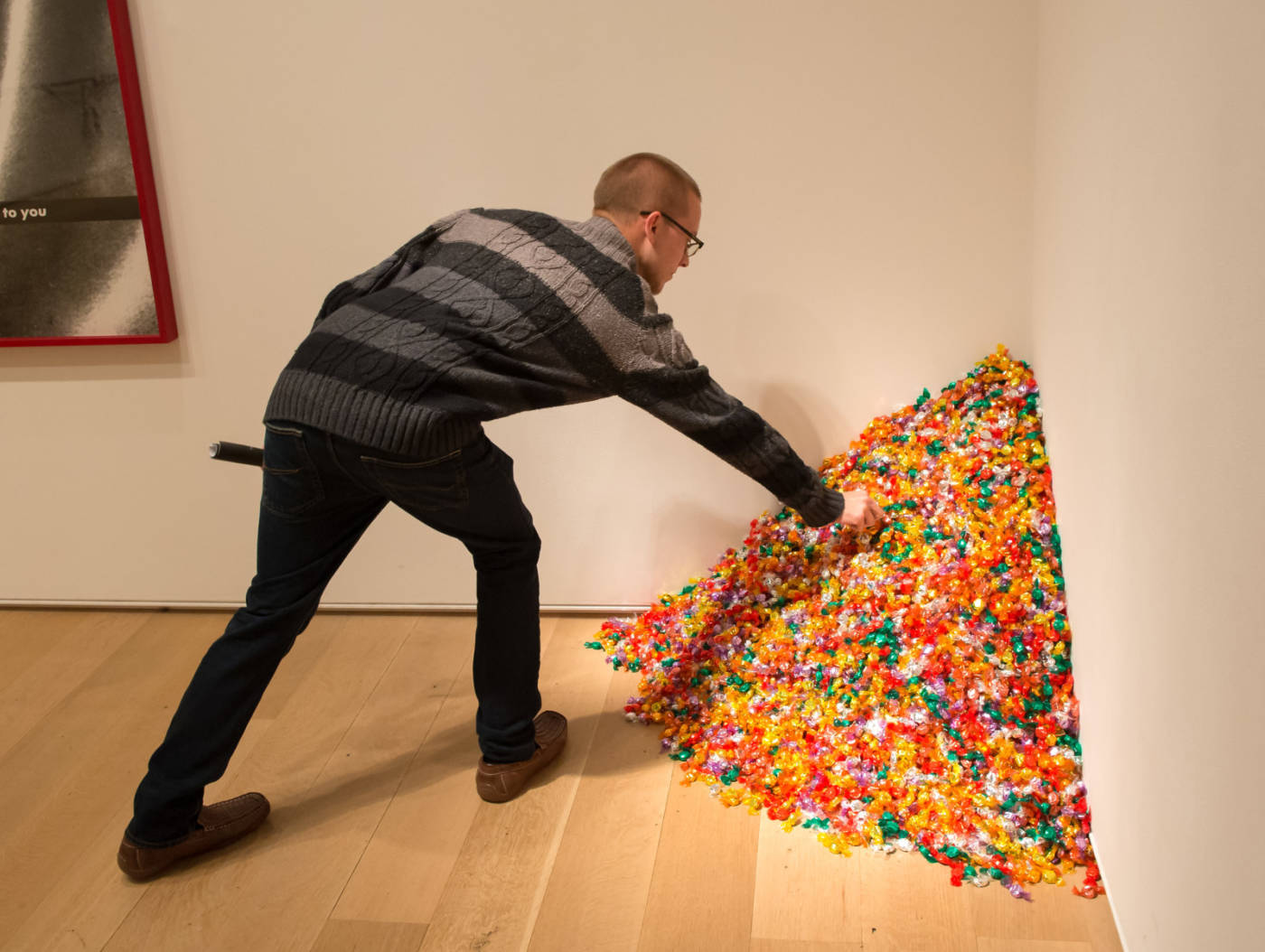
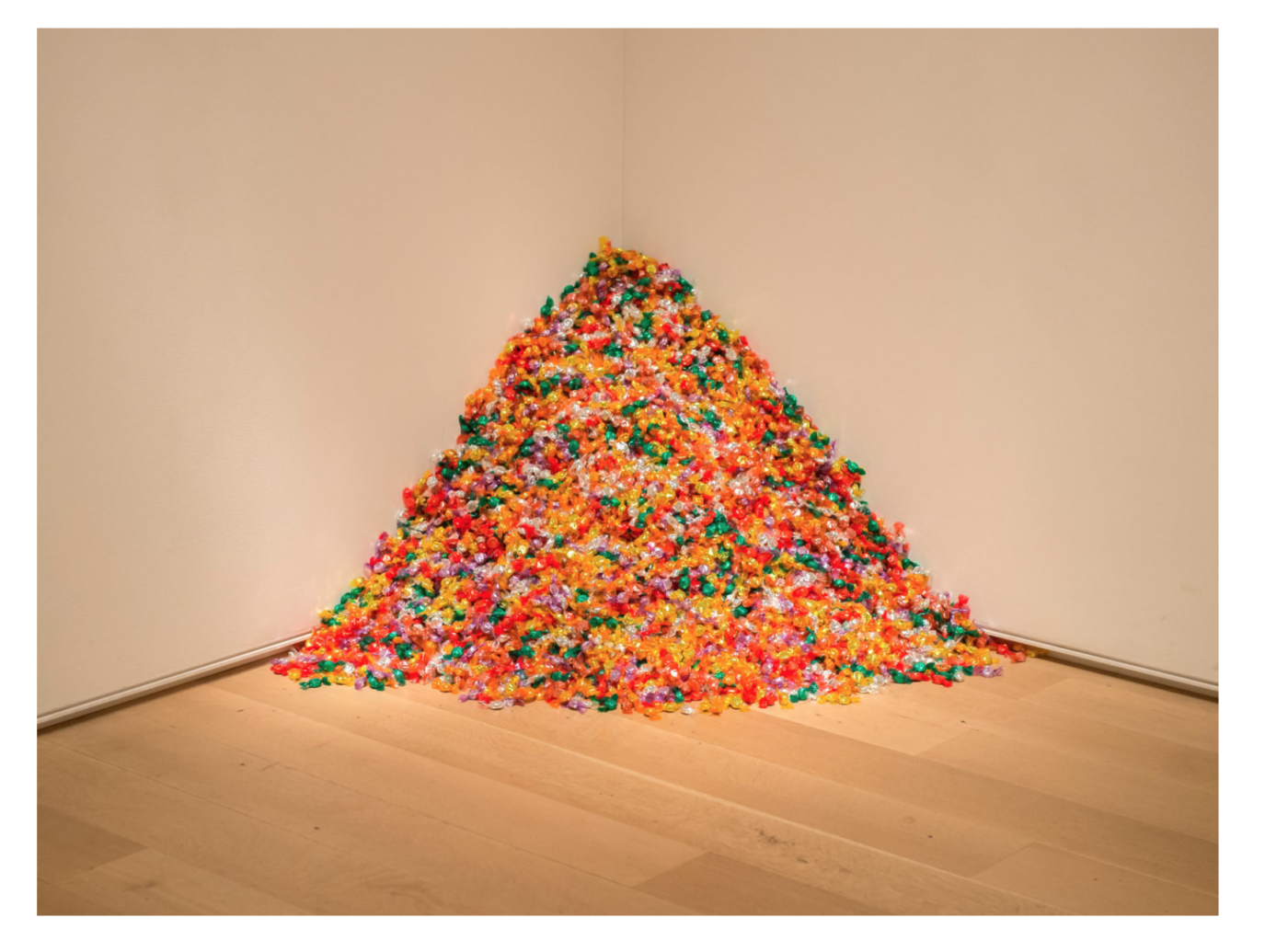
Untitled (Portrait of Ross in L.A.), 1991
The approximate 175 pounds of candy that make up the work resembles the 175-pound body of Ross Laycock, the artists’ boyfriend who died of AIDS in 1991. As each person takes a piece of candy, they in turn act as the AIDS virus depleting Ross’ body, piece by piece taking it away until there is nothing left. Felix Gonzalez-Torres, who dedicated his artwork to the one he loved and lost, died in 1996 of AIDS.
His work doesn’t only represent the disease and its depletion on the body, but it represents the love between the person who is suffering from the disease and the person who is there to support them and suffer with them. The sweet candy, in and of itself, is a representation of love. If you think about giving candy to a loved one on valentine’s day, sweets in a box with flowers on mother’s day, candy has long been tied to affection and love. While the candy is eaten, while the body begins to disappear, the love remains.
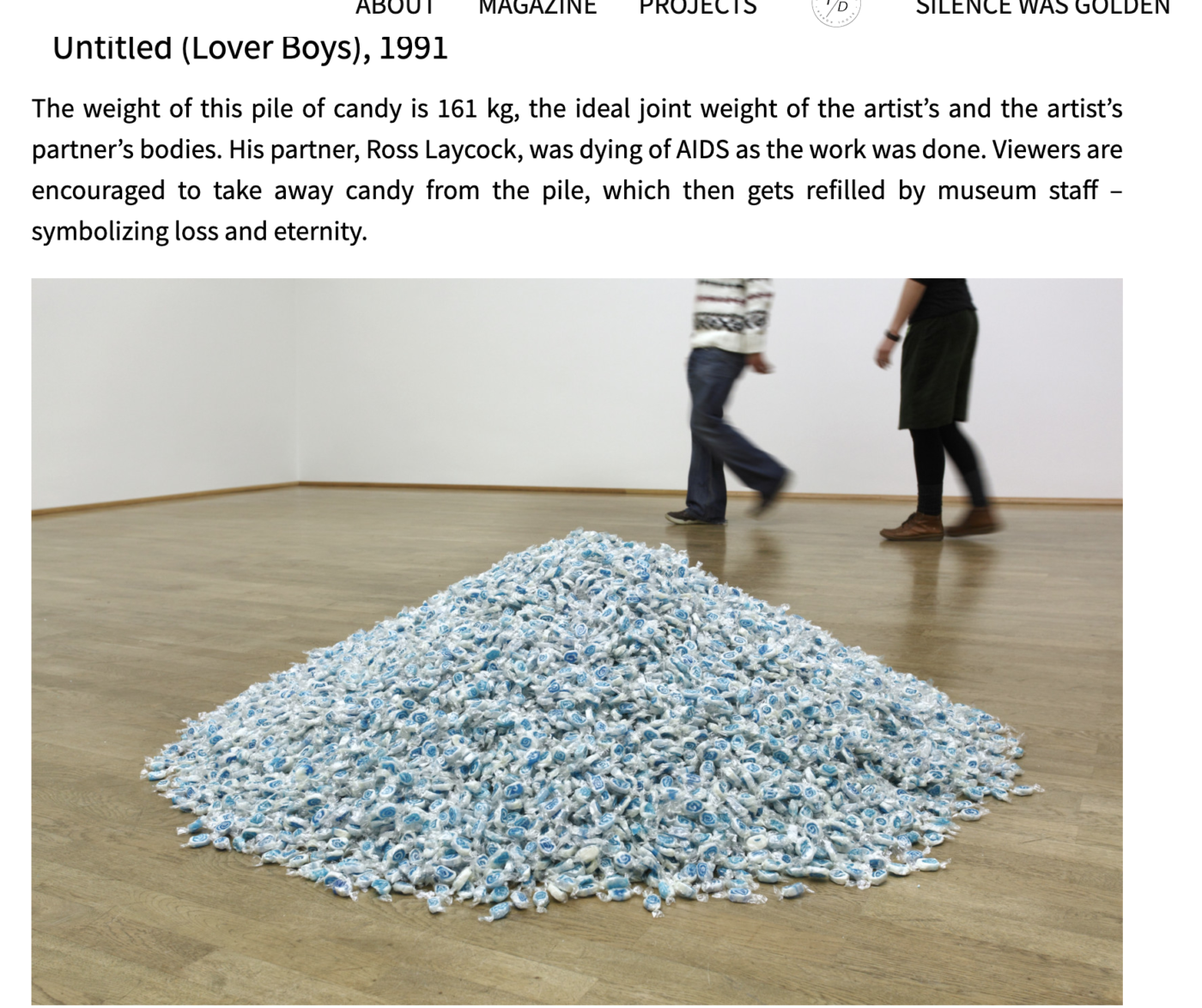
Rene Morin, 2023
Morin made this video to document the things they noticed about Canada after living abroad – a kind of portrait of a place through European eyes. They listed the items in alphabetical order, and used found images from the internet, along with some of their own photographs to document them.
What’s she thinking?
Inspired by Kelly Marks cat video, my piece shows a ‘portrait’ of Paris through her reactions. When it comes to fight or flight horses are a flight animal. They can have big reactions to small things, then no reaction at all to something that you would expect to scare them. Using Paris for this idea works perfectly because she won’t be acting. If I were to have done this with one of my friends, wether they realize it or not, their reactions would be fake or exaggerated because they know I want a reaction from them. Whereas my horse doesn’t understand what is happening. If she is scared she will run, and if she doesn’t care about what I have to show her she will just stare at me or walk away. So by using her I am able to capture a genuine reaction every time. I am happy to say I have a very curious and brave horse, which is shown through the video. It is interesting how we can get a sense of her goofy personality through watching what she thinks of something like an umbrella, or a flag. While watching you can also get a sense of our relationship. I have owned Paris for three and a half years now, overtime gaining her trust and forming a bond. Her reactions are contingent on that trust.”
Ashleigh Knight, 2023
Experimental Studio SART 2800
Make a CONCEPTUAL PORTRAIT*
– Uncommon documentation of an aspect of life
– A collection of objects to make a portrait
– A material stand-in for an abstract concept
-Results of an experiment performed to learn about something
Works can be in prints, slide-show images, video, audio, or found object sculptures and installations. Consider using text in your work when needed. Maximum limit for time-based works is 3 minutes.
_____________________________________________________________________
“In conceptual art the idea or concept is the most important aspect of the work… all planning and decisions are made beforehand and the execution is a perfunctory affair. The idea becomes the machine that makes the art.”
Sol Lewitt, from Peter Osborne, Conceptual Art, Phaidon, Themes & Movements
“The system is the work of art; the visual work of art is the proof of the System. The visual aspect can’t be understood without understanding the system. It isn’t what it looks like but what it is that is of basic importance. “
Sol Lewitt
For this open media project you will create a representation of someone or something – in a non-literal way. You will create your conceptual portrait by using a system – like a rule, a formula, a series of tasks, or an experiment to plan and create the work. Your work will not be narrative or decorative – it will include only what is necessary to convey your information, follow your task, or show the results of your experiment.
Let the system be the “machine that makes the art.”
Some artist references:
| Christian Marclay Mel Bochner On Kawara The Bechers Hiroshi Sugimoto John Baldessari Kelly Mark Germaine Koh Sandy Plotnikoff Spring Hurlbut | Felix Gonzales Torres Micah Lexier Germaine Koh Sophie Calle Tom Friedman Douglas Gordon Roula Partheniou Hannah Black Dean Baldwin Katie Patterson |
On the Blog: DRAFT a proposal of your ideas for discussion in the next class
Write about an artist reference from the lecture that informs your thinking – use images and prepare to discuss your proposal in our next class meeting:
*See schedule for work time and critique dates.
